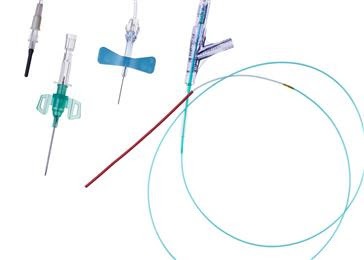Clariant, a world leader in specialty chemicals, is introducing new polymer compounds specially formulated to limit or even eliminate hydrolytic degradation, which is known to affect certain materials commonly used in catheters.
Offered under the MEVOPUR brand name, the new resins are being presented for the first time at the MD&M West tradeshow taking place February 5-7, 2019, in Anaheim, CA. Clariant is exhibiting in Booth 2049.
In polyether block amides (PEBA) and certain thermoplastic polyurethanes (TPU), adsorbed moisture can cause a breakdown of the polymer chains and reduce the mechanical properties, rendering these ductile and tough materials brittle. This effect may be especially pronounced in resins with radiopaque fillers that make them visible to physicians and surgeons when exposed to X rays. Even with careful pre-drying of the ingredients prior to compounding and tube extrusion, hydrolysis remains a risk. Moisture also can condense from the atmosphere, even inside foil-lined packaging, due to changes in temperature during transportation or storage.
“This hydrolysis effect is variable and difficult to predict,” explains Eric Rohr, Medical & Pharmaceutical Segment Manager, North America. “Uncontrolled it creates quality and reliability risks, increasing the need for vigilance in QA procedures. In addition, the shelf-life of the polymer compounds is less predictable and may be shortened to only a few months. After several years of research and testing, we are pleased to be able to limit the risk of hydrolysis and breakage in these materials, thereby helping device manufacturers improve the reliability of catheters.”
One of the first indications of chain scission is an increased melt-flow index (MFI). So, Clariant researchers compared the MFI of a standard, unmodified tungsten-filled PEBA 35 Shore A compound against a sample of the new MEVOPUR.

TEST RESULTS
After 10 weeks storage under humid conditions, the unmodified compound showed more than double the original MFI values, and a wider spread, indicating chain scission and reduction in molecular weight. In comparison, the MEVOPUR compound maintained its MFI values in the same range as before the test began. These results indicate that the polymer chains had not been broken to same extent.
Similar results were noted in testing of tungsten-filled aliphatic thermoplastic polyurethane (TPU) Shore 90A compound. Again, the MFI of the MEVOPUR compound was hardly affected by the humid conditions.
Tensile strength and elongation properties in stand ard test bars molded from the test materials were similarly unaffected in MEVOPUR compounds, while the standard material shows significant degradation in these critical properties.
Clariant credits the superior performance of the MEVOPUR materials to their proprietary formulation and specially developed processing technology.
Like all MEVOPUR masterbatch concentrates and finished compounds, the new modified PEBA and TPU polymers are manufactured at a dedicated facility in Lewiston Maine, and at two other sites in Malmo, Sweden, and Singapore. All three plants have been certified compliant with ISO13485-2016, the latest quality management system for medical devices. After a 3-year grace period, all new device submissions must now prove certification to the 2016 standard. The MEVOPUR brand assures device manufacturers that, from USP Class VI, ISO10993 pre-tested raw material ingredients to final product, the Clariant processes are controlled, consistent and compliant.
The MEVOPUR portfolio has included PEBA, TPU, PA12, and various radiopaque fillers for more than 10 years and, more recently, fluoropolymers were added.
MEVOPUR® IS A TRADEMARK OF CLARIANT REGISTERED IN MANY COUNTRIES.
About Clariant
Clariant is a globally leading specialty chemicals company, based in Muttenz near Basel/Switzerland. On 31 December 2017 the company employed a total workforce of 18 135. In the financial year 2017, Clariant recorded sales of CHF 6.377 billion for its continuing businesses. The company reports in four Business Areas: Care Chemicals, Catalysis, Natural Resources, and Plastics & Coatings. Clariant’s corporate strategy is based on five pillars: focus on innovation and R&D, add value with sustainability, reposition portfolio, intensify growth, and increase profitability.

















![Sirio Launches Global Research Institute for Longevity Studies [SIA]](https://www.worldpharmatoday.com/wp-content/uploads/2019/09/Sirio-218x150.jpg)

